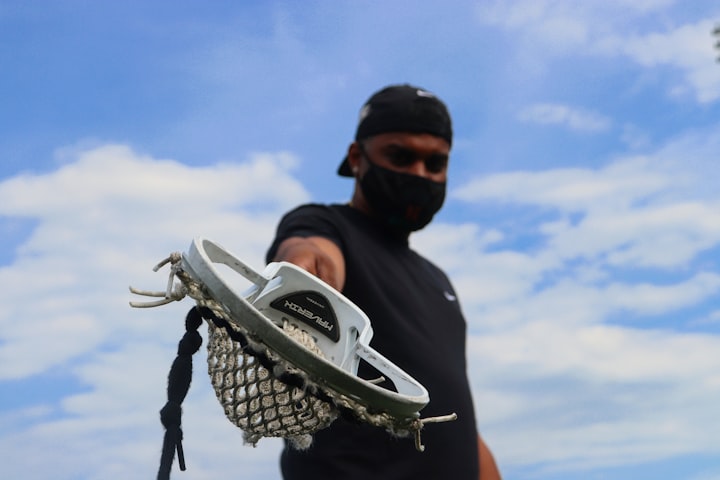How do you build a culture around an unknown sport?
The heartland of Italian Motorsports and the fastest game on two feet - Lacrosse in Imola

Imola is a small City in the Bologna Metropolitan area famed for its racetrack, which has been a fixture in the F1, SBK, MotoGP and MXGP calendar over the years.
Motorsports reign supreme in what would otherwise be a sleepy city. You can hear the roar of the engines from any apartment and if, (like me) you live opposite the starting grid, your windows may even rattle at the beginning of every race.
We have vintage car shows in the racetrack, we have dealerships, we have motorbike equipment and clothing stores. Motorsports have permeated the culture such that if you cut us, we’d bleed engine oil.
What if I told you that we also have;
First division Frisbee team
Second division Basketball team
Second division American Football team
Third division Baseball team
Third division Roller Hockey team
Third division Football team
Nationally ranked cyclists of various disciplines.
Nationally ranked olympic lifters, swimmers, gymnasts and martial artists.
A nationally ranked athletics program.
Whilst the beating heart of Imola will always be the racetrack, it’s fair to say that it’s 70,000 inhabitants are into sports.
What does this mean from a recruitment standpoint?

In most other small cities or large towns we’d only be competing with football, basketball and volleyball but in Imola (whilst I’m glad the opportunities exist) we are competing with so many more programs, for players, for resources and for exposure.
So the question is this. How can our Lacrosse team improve recruitment and retention, in a city that offers every sport under the sun?
As far as recruitment goes we’ve tried (and are trying) every trick in the book. From sessions at high school P.E classes to sports fairs. From social media campaigns to joint practises with other sports we have been working on this from every possible angle.
Many have been through our ranks, too few stay. People stop playing for a multitude of different reasons and more often than not it has nothing to do with Lacrosse itself. In a perfect world we’d have a first, second and third (beer league) team. We’d have youth teams. This is not yet the reality (but I'm ademant that it will be) and instead of stressing out we try and control that which can be controlled.
So what can we control?
We can decide what kind of environment we want to create, what kind of team we want to be and what kind of culture we want to foster.

Make it fun
Unlike other sports, we don’t have a fixture every weekend. We play a handful of games a year, so it really is crucial we make practise enjoyable, given that it’s where we will be spending most of our season. The bulk of our team have never played another sport, and the ones that have were tired of being in an overly rigid environment. Make practise fun for everyone and people will come back.
Put the players first
Ask your players why they’re here. Ask your players what their expectations are, what they hope to achieve, as players, as a team. Ask them what drills they enjoy, what drills they don’t. Give them feedback and get it back. Make it about them (even more vital for youth teams).
Develop physical literacy
Lacrosse is an invasion sport where you run up and down a pitch. It is played 360 degrees which means not only full field sprints but lateral movements both on offence and defence (akin to basketball). Arguably, the main element is throwing and catching. In order to develop these skills we play frisbee, we play handball, we play different versions of tag. We play any game that has transferrable skills, so that new players can ease into Lacrosse and so that veterans can round out their skillset and further develop physical literacy.
Drills that simulate gameplay
In order to prepare players for their first game, you need to put them in situations that simulate gameplay. Drills that put players against each other, drills where players need to make quick decisions, drills where the outcome is uncertain - just like in a game.
Make them believe in themselves

Lacrosse is a sport unlike anything most people have ever tried. When you pick up a stick you will feel stupid. When you drop a pass, can’t pick up a ground ball, learn to cradle (a movement you do to keep the ball in your stick whilst running) you'll feel utterly ridiculous.
You will probably spend the first six months or so feeling like an absolute idiot, and not just on the pitch but off it too. You’ll find yourself fielding questions and comments such as, “What’s that?” “Oh is that a racket?” “Are you going fishing?” “Is that for hunting butterflies?”.
So you’re doing a sport that is physically demanding and requires you to develop skills from the ground up, whilst having everyone in your life struggle to understand “What is it that you play exactly?”
As a coach it is of critical importance that we create an environment where we toe the line between “So easy it’s boring” and “This is too difficult, I quit." You want players to be just outside their comfort zone so much so that they struggle, but not so much that they quit.
ZPD (zone of proximal development). Loosely put it constitutes the distance between what a learner can do without help, and what they can do with help from somebody more knowledgeable than they are.
Put people just outside their comfort zone, whilst also providing them help when they need it. What this does is show people that they are capable of doing much more than they originally thought, which in turn translates into players realising they can BE more than they thought.
Participation is more important than performance (for now)

We don’t focus on performance as such. We focus on doing the basics well, using proper mechanics, playing fast and having fun, and if you do all that, performance will increase organically. Make sure the players have fun, that they have a reason to keep coming back and the rest will take care of itself. People that want to get bigger, leaner, faster, stronger will do it in their own time. Similarly, anyone serious about getting better hands will throw and catch on their own time and those that are into strategy will watch games on their own time. As coaches we encourage people to do all of these things and we’re always on-hand for suggestions and advice, but there’s really no point in forcing a player into anything. The best motivation is intrinsic motivation, that is to say, the athlete does it because they want to do it. All we really do is guide them and provide support.
#growthegame
If we want to #growthegame in Italy we have to make it an environment unlike anything else. We have to provide people with something that other people don’t, a unique selling point (USP) if you will.
As a club we have a USP, it's that we’re essentially a youth team. On a national level it's not uncommon for 14 and 30 year olds to share the field, so to have a team that is mostly made up of 16-20 year olds means the kids are able to bond incredibly well. They're on the same page when it comes to music and fashion. They watch YouTube, scroll Instagram and TikTok. They watch, like and share terabytes of Lacrosse content and it helps create a culture in a country where Lacrosse is only ten years old. They see highlight reels online and try things out in scrimmages. They see drills online and ask if we can run them. They watch coaching videos and ask what offense we're going to run, what slide-packages. With a world of information at their fingertips our team has managed to do something incredibly useful with it.
The #LaxBro and the #LaxGirl have landed in Italy.
Although it saddens me deeply that most of our 20/30 year olds have left, the silver lining is that we’ve created a safe space for teenagers to be themselves and to learn the game of Lacrosse at their own pace, in an environment surrounded by their peers. We have a few adults on the team but the kids come first. As a consequence our team culture is lively, loud and quite frankly a hell of a lot of fun.
The second USP has more to do with European Lacrosse than anything we're actively doing. European Lacrosse is a tight-knit community with open tournaments year round, the bulk of which occur in the summer months. Compared to other sports, we have an unparalleled opportunity to travel and play around Europe. In so doing our players gain invaluable on- field experience as they are able to pack back-to-back games into a single weekend. They gain confidence from facing off against and alongside their European cousins, ranging from club players to seasoned internationals.
Our third USP is the talent-pathway into the national team. As Lacrosse is still in its infancy, participation on a national scale is only in the hundreds or so. If they work at it, the more athletic, skilled and switched on individuals stand a real chance of donning the blue jersey and representing their country one day.
Each team has its own identity and serves a different function to its players, rightly so. For some it's about combining a year abroad with the opportunity to play ball, for some it's about keeping fit, for some it's about the post-game beers, for some it's about competing at the highest level.
For us it's about giving kids an alternative to traditional sports, developing physical literacy, broadening their horizons and helping them to be the best athlete they can be.
Make it accessible. Make it fun. Make it challenging (enough).
#growthegame.






Comments
There are no comments for this story
Be the first to respond and start the conversation.